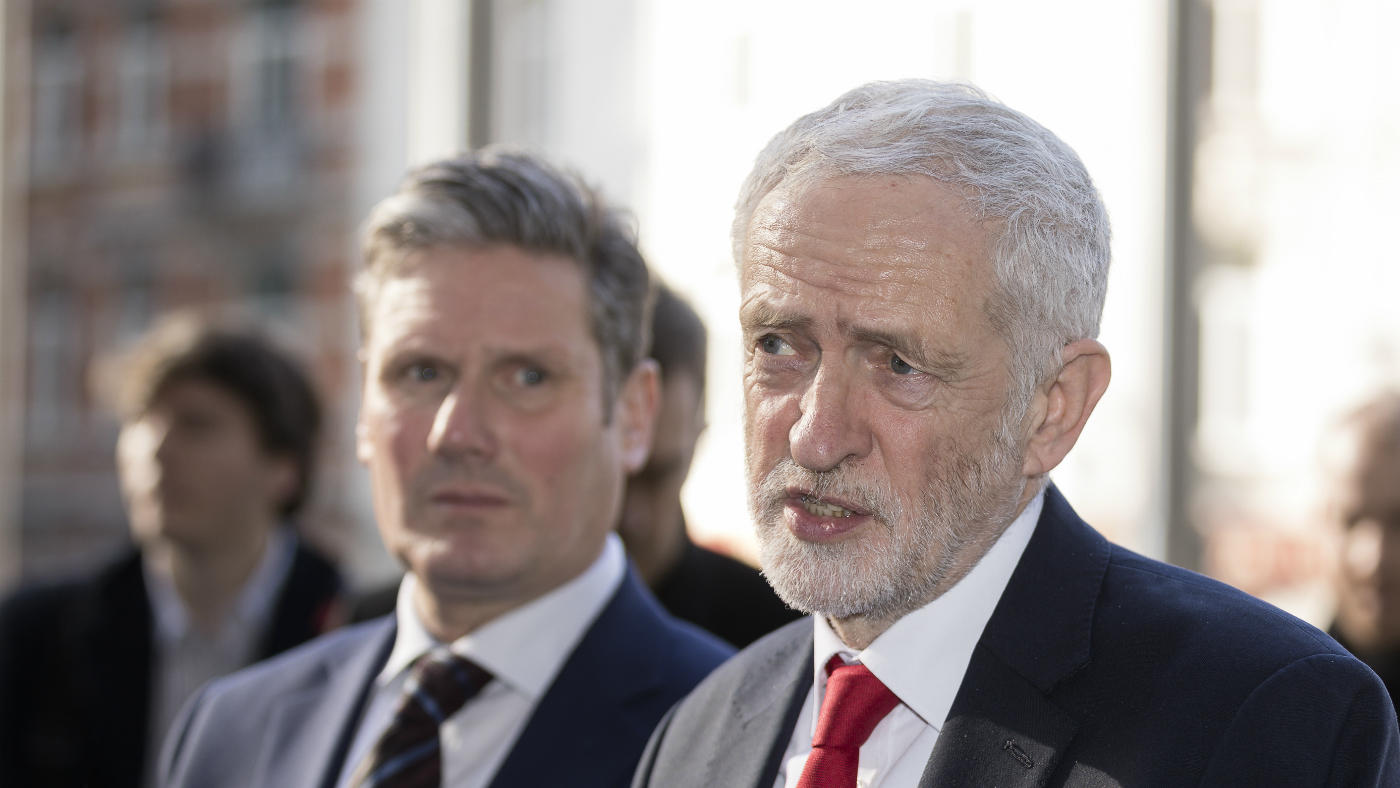Was suspending Jeremy Corbyn the first big misstep of Keir Starmer’s leadership?
Former leader readmitted to party but will not have Labour whip restored

A free daily email with the biggest news stories of the day – and the best features from TheWeek.com
You are now subscribed
Your newsletter sign-up was successful
Jeremy Corbyn has been reinstated to Labour following his suspension from the party but will not have the whip restored - meaning he will no longer sit as a party MP.
The decision to resume Corbyn’s 55-year membership less than three weeks after the former party leader was suspended over an anti-Semitism row has been “hailed by his supporters”, but “threatens the shaky truce with Jewish Labour members and concerned MPs”, The Guardian says.
Acknowledging these tensions, current leader Keir Starmer yesterday tweeted that the decision marked “another painful day for the Jewish community and those Labour members who have fought so hard to tackle antisemiticism”.
The Week
Escape your echo chamber. Get the facts behind the news, plus analysis from multiple perspectives.

Sign up for The Week's Free Newsletters
From our morning news briefing to a weekly Good News Newsletter, get the best of The Week delivered directly to your inbox.
From our morning news briefing to a weekly Good News Newsletter, get the best of The Week delivered directly to your inbox.
What has happened with Corbyn’s party membership?
Corbyn was suspended at the end of October after an inquiry by the Equality and Human Rights Commission (EHRC) concluded that Labour was “responsible for unlawful acts of harassment and discrimination” during its handling of anti-Semitism complaints.
In response to the watchdog’s report, Corbyn issued a statement claiming that the “scale of the problem” was “dramatically overstated for political reasons by our opponents inside and outside the party, as well as by much of the media”.
Following the suspension of any Labour member, the evidence against them is investigated by Labour staff in the party’s Governance and Legal Unit (GLU). The GLU then gives its recommendations to a panel of five members of the National Executive Committee (NEC).
A free daily email with the biggest news stories of the day – and the best features from TheWeek.com
In other words, the NEC, rather than Starmer and his team, made the decision to reinstate Corbyn.
And Starmer has announced that despite his reinstatement as a member of the party, Corbyn will not resume the Labour whip and will not sit as a Labour MP. In a tweet earlier today, the party chief wrote that his predecessor had “undermined and set back our work in restoring trust and confidence in the Labour Party’s ability to tackle antisemitism”.
However, Starmer added that “I will keep this situation under review”.
Meanwhile, supporters of Corbyn have “seized on a clause in the Labour Party rulebook that states that Labour MPs must also be members of the parliamentary Labour Party” - which they claim means that he “was automatically returned to the Labour whip after he was readmitted to the party”, The Times reports.
James Schneider, Corbyn’s former director of strategic communications, told BBC Radio 4’s Today programme that “it would be a decision for the leadership to now withdraw the whip if that’s what they wanted to do”.
And the reaction?
Unite general secretary Len McCluskey, a close ally of Corbyn, has welcomed the former leader’s readmission as the “correct, fair and unifying decision”.
“As a party we now move forward to implement the EHRC’s recommendations and redouble our efforts to inspire voters about Keir’s 10 pledges and the transformation of our nations into fairer places for our people,” McCluskey tweeted.
In a further show of support, five Labour councillors in Lancaster resigned from the party last night just minutes before Corbyn was reinstated, in protest against his treatment. The group insisted the surprise move had not altered their position, and described Corbyn’s suspension as “an unjust attack on a decent man and an attack on the Left”.
But the decision to welcome him back has caused anger too.
The Guardian reports that “at least one Labour MP” told colleagues on Tuesday night that they felt “betrayed” by Corbyn’s reinstatement and were “considering their position in the party”.
The Jewish Labour Movement (JVM) has also expressed anger over the “extraordinary” move, which the group claims was the work of a “factionally aligned political committee”.
Labour MP Margaret Hodge has condemned the decision too, saying: “I simply cannot comprehend why it is acceptable for Corbyn to be a Labour MP if he thinks anti-Semitism is exaggerated and a political attack, refuses to apologise, never takes responsibility for his actions and rejects the findings of the EHRC report.”
Has Starmer made a strategic misstep?
The Labour leader has a “tight window to decide what to do about Corbyn, if he is to avoid handing Boris Johnson a gift”, The Telegraph says. But “it is how it plays out in his own party that will probably be the bigger concern”.
The BBC’s political correspondent Iain Waston argues that whichever decision Starmer had taken, “criticism would have followed”.
“Putting Labour under fresh leadership hasn’t silenced or banished those still supportive of the old leadership,” Watson writes, but reinstating Corbyn “was bound to attract criticism from those cheered by his suspension”.
All the same, Corbyn’s return should “smooth Starmer’s efforts towards unity with the left of the party” following a turbulent few months, says The Guardian.
Sounding a less positive note, the New Statesman’s political editor Stephen Bush suggests that entire drama surrounding Corbyn’s membership has been “an unmitigated disaster” for Starmer, and “will do nothing to repair relations with Britain’s Jewish community”.
Starmer is not “trusted by the party’s Corbynite wing, in part because of Corbyn’s suspension”, Bush writes. “But in having been outplayed in the party’s internal structures and institutions, he has not won any new allies either.”
-
 Growing a brain in the lab
Growing a brain in the labFeature It's a tiny version of a developing human cerebral cortex
-
 How are Democrats trying to reform ICE?
How are Democrats trying to reform ICE?Today’s Big Question Democratic leadership has put forth several demands for the agency
-
 Silicon Valley: Worker activism makes a comeback
Silicon Valley: Worker activism makes a comebackFeature The ICE shootings in Minneapolis horrified big tech workers
-
 Who is Keir Starmer without Morgan McSweeney?
Who is Keir Starmer without Morgan McSweeney?Today’s Big Question Now he has lost his ‘punch bag’ for Labour’s recent failings, the prime minister is in ‘full-blown survival mode’
-
 Why the Gorton and Denton by-election is a ‘Frankenstein’s monster’
Why the Gorton and Denton by-election is a ‘Frankenstein’s monster’Talking Point Reform and the Greens have the Labour seat in their sights, but the constituency’s complex demographics make messaging tricky
-
 The Mandelson files: Labour Svengali’s parting gift to Starmer
The Mandelson files: Labour Svengali’s parting gift to StarmerThe Explainer Texts and emails about Mandelson’s appointment as US ambassador could fuel biggest political scandal ‘for a generation’
-
 Will Peter Mandelson and Andrew testify to US Congress?
Will Peter Mandelson and Andrew testify to US Congress?Today's Big Question Could political pressure overcome legal obstacles and force either man to give evidence over their relationship with Jeffrey Epstein?
-
 Reforming the House of Lords
Reforming the House of LordsThe Explainer Keir Starmer’s government regards reform of the House of Lords as ‘long overdue and essential’
-
 How long can Keir Starmer last as Labour leader?
How long can Keir Starmer last as Labour leader?Today's Big Question Pathway to a coup ‘still unclear’ even as potential challengers begin manoeuvring into position
-
 What is at stake for Starmer in China?
What is at stake for Starmer in China?Today’s Big Question The British PM will have to ‘play it tough’ to achieve ‘substantive’ outcomes, while China looks to draw Britain away from US influence
-
 Can Starmer continue to walk the Trump tightrope?
Can Starmer continue to walk the Trump tightrope?Today's Big Question PM condemns US tariff threat but is less confrontational than some European allies